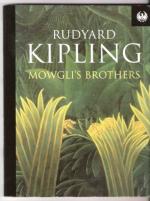|
This section contains 2,083 words (approx. 6 pages at 400 words per page) |

|
Martinelli is a Seattle-based freelance writer and editor. In this essay, Martinelli examines the identity of the main character, Mowgli, through rational and empirical philosophical doctrines.
In "Mowgli's Brothers," Rudyard Kipling tells the tale of his celebrated "man-cub," who is rescued from certain death as an infant and raised by a pack of wolves. Although a human being, Mowgli effectively becomes a "wolf cub" in nearly every other respect and grows to adopt the Law of the Jungle as his code of behavior. However, through his innate ability to reason, Mowgli soon recognizes the existence of the Law of Man as a distinct code of behavior, a recognition that immediately gives rise to a conflict between codes, sending Mowgli into an existential crisis. Mowgli is, essentially, a character trapped between the Law of the Jungle and the Law of Man. Mowgli's struggle to resolve this crisis represents...
|
This section contains 2,083 words (approx. 6 pages at 400 words per page) |

|




